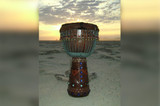Martillo Bongo Rhythm
When first learning to play the bongos, the different sounds and tones produced from the bongos can inspire creative patterns and fills that compliment any recording or performance. These same improvisational rhythms are used to enhance the sound of a drum circle, making the bongos a Latin-flavored compliment to the timbre of the djembe or any other percussion instruments being played. Once the basics of bongo playing have been mastered, the burgeoning Bongocero may wish to incorporate traditional rhythms into play, especially the Martillo, as a tribute to the history and brilliance of bongo playing.
The Martillo, meaning, "hammer," is the standard, basic rhythm attributed to the bongos. It is a rhythm that can be played fast or slow, alone or with son clave, to help create a definite Latin feel to any performance or circle. The Martillo consists of eight strokes in a one-bar pattern that repeat. Both hands rotate the beats played throughout the eight strokes, but only the dominant hand plays the hembra, or larger drum in a set of bongos, on the seventh beat. The smaller drum, or macho, receives the majority of strokes from both hands. These vary from open strokes, muted strokes and slaps, producing a rhythm that is consistent and able to stand alone or compliment other instruments being played. Some classic Bongoceros replace the fourth and eighth beats with the "heel-tip," stroke, giving it a different sound and feel than a muted stroke.
The diversity of the Martillo rhythm makes it possible to incorporate into genres of music other than rumbas or son-inspired Latin music including Caribbean, Funk or Pop music. It is a traditional and historical rhythm that adapts well to groups and drum circles, helping to establish an exciting sound that others can use to build upon. The Martillo rhythm adapts well to the son claves and is thought to be as important to the bongos as the tumbao is to the conga drums or the ride cymbal pattern is to jazz drumming.
Recent Posts
-
What is the Best Size Djembe for Beginners?
If you're new to the world of percussion and interested in learning the djembe, you're in for a t …16th Jul 2024 -
The Benefits of Becoming a Drumming Teacher: Transforming Passion into Profession
Why become a drumming teacher? Becoming a drumming teacher is an excellent way to share your pas …22nd May 2024 -
What Makes the Djembe Drum a Spiritual Instrument in African Music?
Origin and history of the Djembe drum The Djembe drum originates from West Africa and holds sign …16th May 2024



